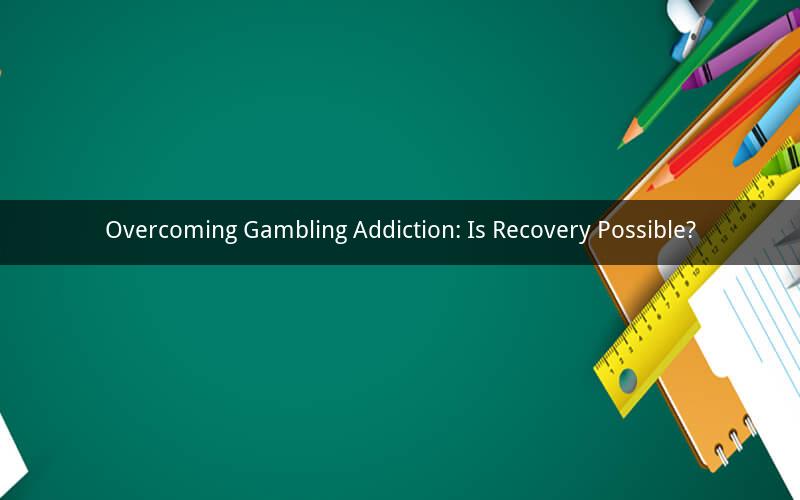
Introduction:
Gambling addiction has become a prevalent issue in today's society, affecting millions of individuals worldwide. Many people wonder if it is possible to recover from this addiction and lead a fulfilling life. This article explores the complexities of gambling addiction, the available treatment options, and the journey towards recovery.
1. Understanding Gambling Addiction:
Gambling addiction, also known as problem gambling or compulsive gambling, is characterized by an inability to control the urge to gamble, despite negative consequences. It is a mental health disorder that can lead to financial, emotional, and social problems. Understanding the nature of gambling addiction is crucial in addressing its treatment and recovery.
1.1 Signs and Symptoms:
Identifying the signs and symptoms of gambling addiction is essential in seeking help. Common indicators include:
- Inability to control gambling behavior
- Preoccupation with gambling thoughts
- Needing to gamble more money to achieve the same thrill
- Feeling restless or irritable when attempting to stop gambling
- Continual attempts to stop gambling without success
- Lying to family, friends, or therapists about gambling activities
1.2 Risk Factors:
Several factors contribute to the development of gambling addiction. These include:
- Genetic predisposition: Research suggests that genetics play a role in the susceptibility to gambling addiction.
- Environmental factors: Exposure to gambling opportunities, such as casinos or online platforms, can increase the risk.
- Psychological factors: Stress, anxiety, and depression can trigger gambling behavior as a coping mechanism.
- Social factors: Peer pressure and the desire to impress others can contribute to the development of gambling addiction.
2. Treatment Options:
Recovery from gambling addiction requires a comprehensive approach that addresses the underlying causes and provides support throughout the process. Various treatment options are available, including:
2.1 Therapy:
Therapy is a crucial component of gambling addiction treatment. It helps individuals understand their addiction, develop coping strategies, and address underlying issues. Common therapeutic approaches include:
- Cognitive-behavioral therapy (CBT): CBT focuses on identifying and changing negative thought patterns and behaviors associated with gambling addiction.
- Dialectical behavior therapy (DBT): DBT helps individuals regulate emotions and develop skills to cope with cravings and triggers.
- Family therapy: Family therapy addresses the impact of gambling addiction on relationships and provides support to family members.
2.2 Support Groups:
Support groups, such as Gamblers Anonymous, provide a platform for individuals to share their experiences, receive support, and gain insights from others who have overcome gambling addiction. These groups offer a sense of community and accountability.
2.3 Medication:
In some cases, medication may be prescribed to help manage symptoms of gambling addiction. Antidepressants, mood stabilizers, and anti-anxiety medications may be used to address underlying mental health issues that contribute to gambling behavior.
3. The Journey Towards Recovery:
Recovery from gambling addiction is a challenging but achievable goal. It requires commitment, perseverance, and a willingness to change. Here are some key steps in the recovery journey:
3.1 Acknowledging the Problem:
The first step towards recovery is acknowledging that gambling addiction is a problem. This involves recognizing the negative consequences and the need for change.
3.2 Seeking Help:
Once the problem is acknowledged, seeking help is crucial. This can involve consulting with a therapist, joining a support group, or seeking assistance from a gambling addiction helpline.
3.3 Developing Coping Strategies:
Developing healthy coping strategies is essential to prevent relapse. This may include engaging in alternative activities, such as exercise, hobbies, or socializing with non-gambling friends.
3.4 Building a Support System:
A strong support system can provide encouragement, guidance, and accountability throughout the recovery process. This may include family members, friends, therapists, and support group members.
3.5 Relapse Prevention:
Relapse is a common challenge in the recovery journey. It is important to recognize the signs of relapse and have a plan in place to address them. This may involve seeking additional support, revisiting therapy, or recommitting to the recovery process.
4. Frequently Asked Questions:
Q1: Can gambling addiction be cured completely?
A1: While there is no guaranteed cure for gambling addiction, recovery is possible. With proper treatment and support, individuals can learn to manage their addiction and lead a fulfilling life.
Q2: How long does it take to recover from gambling addiction?
A2: The duration of recovery varies for each individual. Some may experience immediate improvement, while others may require ongoing treatment and support for several years.
Q3: Can medication help with gambling addiction?
A3: Medication can be prescribed to manage symptoms of gambling addiction, such as depression or anxiety. However, it is important to note that medication alone is not a cure and should be used in conjunction with therapy and support.
Q4: Can family members be affected by a loved one's gambling addiction?
A4: Yes, family members can be significantly affected by a loved one's gambling addiction. It is important for them to seek support and education to understand the addiction and learn how to cope with its consequences.
Q5: Is it possible to recover from gambling addiction without professional help?
A5: While some individuals may find success in self-help methods, seeking professional help is highly recommended. Therapists, support groups, and helplines can provide valuable guidance, support, and resources throughout the recovery process.
Conclusion:
Recovery from gambling addiction is possible, but it requires determination, commitment, and a comprehensive approach. By understanding the nature of the addiction, seeking appropriate treatment, and building a strong support system, individuals can overcome gambling addiction and lead a healthier, more fulfilling life.